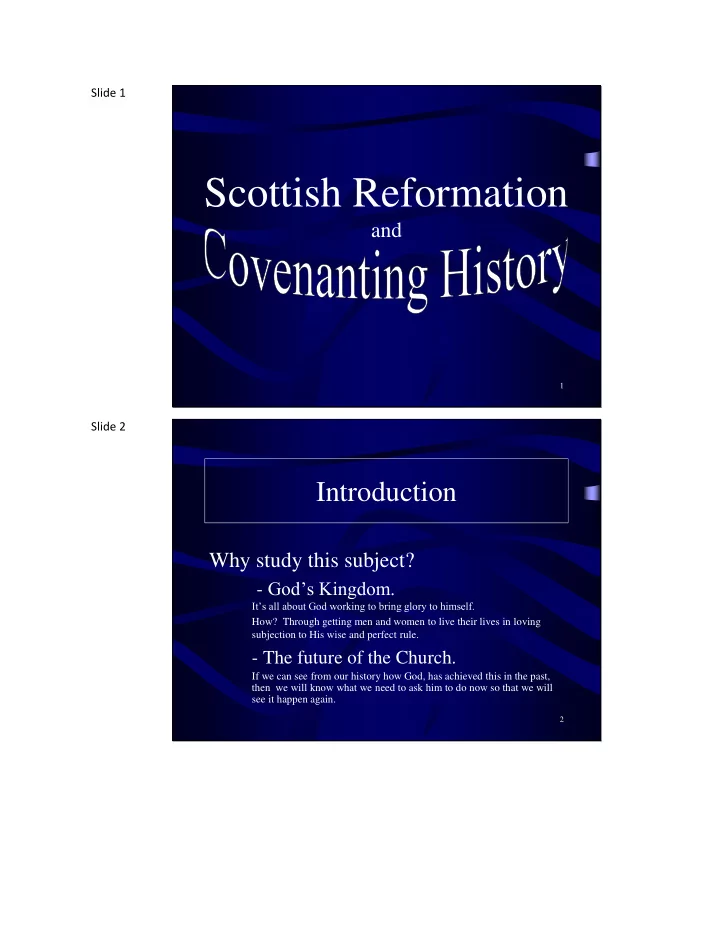

Slide 1 Scottish Reformation and 1 Slide 2 Introduction Why study this subject? - God’s Kingdom. It’s all about God working to bring glory to himself. How? Through getting men and women to live their lives in loving subjection to His wise and perfect rule. - The future of the Church. If we can see from our history how God, has achieved this in the past, then we will know what we need to ask him to do now so that we will see it happen again. 2
Slide 3 3 Slide 4 4
Slide 5 5 Slide 6 6
Slide 7 Pre Reformation Scotland • Church in Scotland prior to 1500’s - Roman Catholic Worship services were conducted in Latin - Major issues regarding the person and work of Christ - Key issues regarding the way of salvation - Godless lifestyle of leadership - Scottish Church most corrupt in Europe This was the same all over Europe 7 Slide 8 GOD TOOK ACTION God raised up men across Europe to lead the reformation of His Church and the building of His Kingdom for His Glory. JohnWycliffe ~ 1320-1384 (English) John Huss ~ 1369 - 1414 (German) Desiderius Erasmus ~ 1466-1536 (Dutch) William Tyndale ~ 1484 -1536 (English) Martin Luther ~ 1483-1546 (German) Ulrich Zwingli ~ 1484-1531 (Swiss) John Calvin ~ 1509-1564 (French) 8
Slide 9 The place of Scotland in the eternal plans of God 9 Slide 10 1 st Scottish 1520-1625 10
Slide 11 Four key men whom God raised up • Patrick Hamilton • George Wishart • John Knox • Andrew Melville 11 Slide 12 Patrick Hamilton The foundation layer and first Martyr • Born 1503 into nobility - mother cousin of King James IV • Educated in Paris and Louvain • Influenced by Luther • 1524 – At St. Andrews and attracts attention from the RC Church 12
Slide 13 • Went to Germany and meet Tyndale • Wrote a thesis ‘Patrick’s Places’ • 1527 - Married & settled at Linlithgow • 1528 - Invited to St Andrews by Archbishop James Beaton • Tried and burnt at the stake on the 29th Feb.1528 13 “How long Lord will darkness overwhelm this Kingdom? How long wilt those suffer this tyranny of men? Lord receive my spirit” Slide 14 George Wishart The Reformation moves to the next stage • Born 1513, educated in France • Heard about Luther and Zwingli • 1532 - Teacher at Montrose • 1538 - Bristol - Europe - Cambridge • 1544 - Preaching in Dundee, Ayr, Dundee 14
Slide 15 • Assassination attempts - Wightman, Montrose • Preaching in and around Edinburgh • Arrest at Ormiston, near Edinburgh • Taken to St Andrews, tried, hung and then burnt on the 1st March 1546 15 Slide 16 John Knox Reformation a national reality • Born 1505, educated in Scotland • Influenced by Wishart • Personal tutor Langriddrie • 1547 - St Andrews and imprisonment 16
Slide 17 1549 - Freed and preached in Berwick, England at Cranmer’s request 1553 - Edward dies and Mary I (Bloody Mary), becomes Regent 1554 - Knox under threat leaves for Europe - back and forth 1558 - Walter Mill put to death 1559 - Knox returns and begins to preach throughout Scotland 1560 - Regent Mary dies, Mary Queen of Scots becomes Queen Scots Confession of Faith ratified by pro-reformation Par. First Book of Discipline ratified by first GA. 1561 - 2 nd GA - Erastianism addressed 1567 - Mary abdicates, infant James VI, pro-reform. Moray regent. The result:- - Worship is simplified, Evangelism - Formal education established - Care of the poor becomes an issue - Parliament passing pro- reform legislation 1570 - Moray assassinated 1572 - Knox dies 17 Slide 18 Andrew Melville Who will govern the Church and How? • Born 1545 and educated in Europe • 1569 - Professor of Hum. in Geneva • 1572 - Pro Episcopalian Morton is Regent Convention of Leith - Tulchan Bishops • 1574 - Principal of Glasgow University • 1575 - Leads GA in Church government debate Presbyterianism or Episcopalianism • 1576 - GA all Bishops must become a pastor • 1578 - GA - 2nd Book of Discipline (Presbyterianism) • 1578 - James VI comes to the throne – ‘Divine Right of Kings’ • 1580 - A National Covenant is signed • 1584 - Melville before the Privy Council • 1584 - Par. Passes the Black Acts • 1584 - 1592 Confusion reigns in Church government. 18
Slide 19 The young Scottish Reformed Church Under threat from Erastianism & Episcopalianism • 1599 - The Woeful Commission • 1603 - James VI crowned King James I of England. He believed in the ‘Divine Right of Kings’ - The God given right of the king of the day to have authority over all states and subjects within his realm. • 1605 - Melville banished to the ‘Tower’ and then France. • 1605 - General Assembly postponed indefinitely by king. • 1607 - Appointment of perpetual moderators (Bishops). • 1610 - General Assembly, the ‘Angelical Assembly’, formally establishes Episcopalian Church government. • 1612 - Scottish Parliament ratifies the 1610 GA decision James VI • 1618 - General Assembly adopts ‘Five Articles of Perth’. • 1621 - Scottish Parliament ratifies the 1618 GA decision 19 Slide 20 Move back to Rome • Charles 1 gives the Cof E Archbishop of Canterbury William Laud the task of uniting the CofE and the CofS • 1636 - Book of Canons • 1637 - Scottish Liturgy Archbishop Laud • 1637 (13 th July) Privy Council demands that all ministers get two copies of Liturgy within 15 days. • 1637 (23 rd July) Dean Hannay stands up in St Giles Cathedral in Edinburgh and began to read from the Liturgy St Giles Cathedral 20
Recommend
More recommend